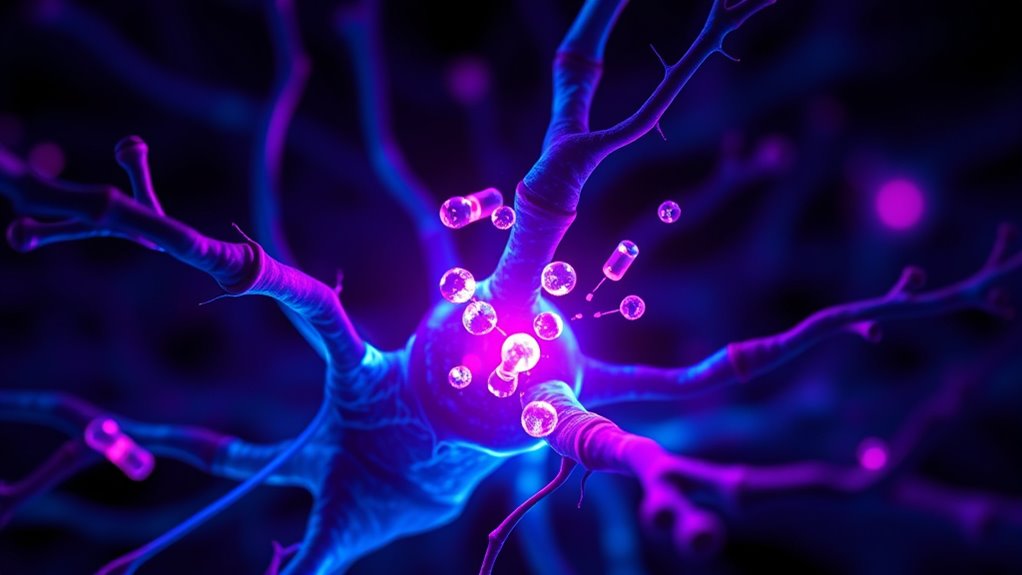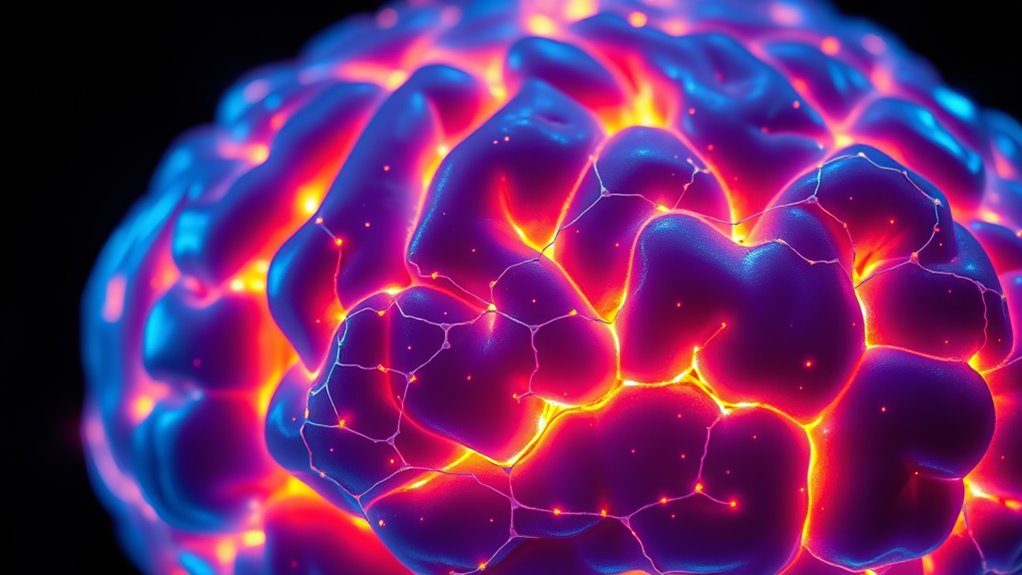Dopamine often gets misunderstood as just a “pleasure chemical,” but it’s really key to your motivation and drive. It signals your brain that effort is worthwhile and helps reinforce habits that lead to success. Many believe boosting dopamine artificially is a quick fix, but long-term motivation depends on a balance within your natural reward system. To discover how you can harness dopamine for sustained drive, explore the facts behind its true functions and myths.
Key Takeaways
- Dopamine fuels motivation by signaling reward anticipation, not just producing instant pleasure.
- It reinforces behaviors and habits by creating satisfaction after positive outcomes.
- Artificially increasing dopamine does not sustainably boost motivation and can harm brain balance.
- Dopamine influences focus and persistence, supporting long-term goal achievement beyond immediate highs.
- Maintaining natural dopamine regulation through healthy habits is essential for sustained motivation and drive.

Dopamine plays a crucial role in fueling your motivation and desire to achieve goals. It’s often called the “feel-good” neurotransmitter because it’s closely linked to pleasure and reward, but it’s also indispensable for driving your actions. When you set out to accomplish something, your brain’s reward system kicks into gear, releasing dopamine as a motivation trigger. This release reinforces behaviors that lead to success, encouraging you to pursue similar goals in the future. Fundamentally, dopamine acts as your internal motivator, signaling that your efforts are worth it and that a reward is on the horizon.
Understanding this reward system helps clarify why certain activities feel more motivating than others. When you experience a positive outcome, your brain floods with dopamine, creating a sense of satisfaction that makes you want to repeat the behavior. This cycle is core to habit formation—your brain’s way of reinforcing actions that lead to rewards. Whether it’s finishing a project, completing a workout, or learning a new skill, dopamine is what makes the effort feel worthwhile. It’s not just about fleeting pleasure; it’s about creating a motivational drive that pushes you forward. The more frequently your brain associates effort with reward, the more natural it becomes to stay motivated.
However, there are many myths surrounding dopamine’s role in motivation. Some believe that dopamine only provides instant pleasure, but it’s more about anticipation and drive. Dopamine doesn’t just give you a quick high; it influences your focus, persistence, and overall motivation to achieve long-term goals. It’s also a misconception that dopamine is solely linked to addiction or that increasing dopamine levels will automatically boost your motivation. While low dopamine can impair your drive, simply boosting it artificially through drugs or supplements isn’t a sustainable or healthy way to stay motivated. Your brain’s reward system relies on a delicate balance, and understanding how motivation triggers work can help you harness dopamine’s power more effectively. Additionally, aligning your mental state with vibrational energy can support naturally enhancing dopamine production and motivation.
Frequently Asked Questions
Can Dopamine Levels Be Naturally Increased Without Medication?
Yes, you can naturally elevate dopamine levels without medication. Engaging in regular exercise, eating dopamine-boosting foods like nuts and bananas, and practicing mindfulness can help. Avoiding excessive stress and getting enough sleep also support natural dopamine production. While dopamine supplements exist, focusing on lifestyle changes is a safer way to promote natural elevation and improve your motivation and mood without relying on medication.
How Does Dopamine Influence Motivation Versus Pleasure?
You might notice dopamine influences motivation more than pleasure. It drives reward anticipation, pushing you to pursue goals, while pleasure reinforcement makes you feel good after achieving them. When you anticipate a reward, dopamine levels rise, motivating you to act. Once the reward is received, dopamine helps reinforce that behavior, encouraging you to repeat it. So, dopamine mainly fuels your motivation through reward anticipation, with pleasure reinforcing your actions afterward.
Are There Risks Associated With Manipulating Dopamine Artificially?
Think of artificially manipulating dopamine like using synthetic enhancement on a delicate machine; it can boost performance temporarily but risks damage. Dopamine addiction is real, and overuse may lead to dependency, mood swings, or decreased natural motivation. For example, some people relying on stimulants face withdrawal symptoms. So, yes, manipulating dopamine artificially carries risks, including addiction and disrupted brain chemistry, making it essential to be cautious with such interventions.
How Do Individual Differences Affect Dopamine’s Role in Drive?
Your individual differences, like genetic variability and personality traits, markedly influence dopamine’s role in drive. You might find that your genetics affect how your dopamine system responds to rewards, impacting motivation levels. For example, extroverted traits often correlate with higher dopamine activity, boosting your drive. Conversely, genetic factors can also make some people less responsive, meaning their motivation may need more external stimuli to spark action.
Can Lifestyle Changes Sustainably Boost Dopamine Levels?
Research shows that lifestyle changes can sustainably boost dopamine levels. Exercise benefits your brain, releasing dopamine that improves motivation and mood. Eating a balanced diet impacts dopamine production, with foods rich in tyrosine supporting its synthesis. By consistently engaging in physical activity and choosing nutritious foods, you can maintain healthier dopamine levels, enhancing your drive and overall well-being over time. Small daily habits make a significant, lasting difference.
Conclusion
So, next time you feel that surge of motivation, remember dopamine isn’t the secret weapon of a modern-day alchemist. It’s a complex messenger, not a magic potion. Don’t fall for the myth that chasing instant hits will make you a hero of your own story. Think of it like steering the uncharted waters of the Age of Exploration—you need balance, patience, and understanding, not just a quick compass fix. Drive is yours to cultivate, not just dopamine’s fleeting gift.









